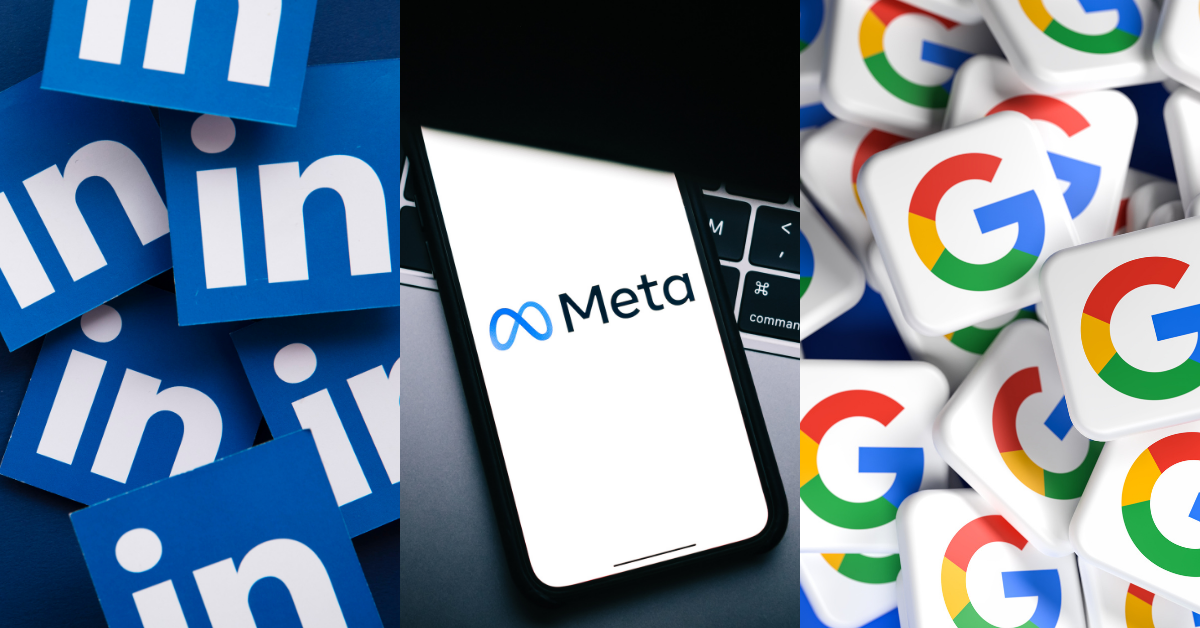
Choosing the best advertising platform for a business can feel overwhelming with so many options to consider. Each platform serves specific audiences and functions, requiring businesses to tailor their messaging and channels accordingly. From email marketing and pay-per-click (PPC) to social media ads and content sponsorship, deciding where to start can be difficult. However, focusing on the three biggest ad platforms—Google, LinkedIn, and Meta—offers businesses the opportunity to reach new customers and drive revenue growth.
Google Ads
Benefits of Advertising on Google Ads
Google’s search engine enables reaching a large audience, as users actively search for products or services. The platform allows businesses to target specific demographics and keywords, meaning connecting with consumers who are more likely to be interested in their services. Google ads also provide tracking and attribution tools, so a business is able to see how their campaigns are performing. Search ads, in particular, are a good tool for reaching consumers who are already interested in what services are offered. Since Google is so familiar to users, they’re more likely to engage with ads they see in search results. Businesses have plenty of data at their fingertips to optimize their campaigns and expand as needed. Google ads aren’t just about search – businesses can also use them for display advertising to build brand awareness and YouTube ads to explain complex products or services, taking advantage of YouTube’s popularity as an online TV platform.
Considerations When Using Google Ads
While Google Ads can be cost-effective compared to other platforms, businesses should be smart about competition and bidding strategies. Google ads are not something you can just set up and forget about – its important to make adjustments regularly. It also takes time for Google to gather data and optimize a business’s campaigns, so instant results are not to be expected. Before beginning, businesses should think about whether the budget for Google Ads works, especially considering how competitive an industry is. Calculating the break-even cost per sale or conversion can help figure out how much to spend to get the desired results. Google ads play a role at the bottom of the marketing funnel, so it’s important to track its performance alongside other marketing efforts.

LinkedIn Ads
Advantages of Advertising on LinkedIn
Advertising on LinkedIn is a great platform for reaching a professional audience, B2B marketing, and networking, where a business’s ads will have higher credibility. Message ads on LinkedIn offers a unique way to connect directly with potential clients. Plus, because fewer companies advertise on LinkedIn, businesses face less competition for their target audience. LinkedIn’s user and company data also make it easier to effectively target specific audiences. Overall, advertising on LinkedIn is seen as more credible, thanks to its focus on professionals and quality engagement.
Factors to Keep in Mind with LinkedIn Advertising
Since LinkedIn users don’t spend a lot of time on the platform and are usually focused on specific tasks, keep messages short and to the point. If a business is all about getting clicks for the lowest cost, LinkedIn might not be the best choice. It’s more about getting quality leads than just driving traffic. Use LinkedIn mainly for generating leads, not for building brand awareness. Pay close attention to how well your ads are turning into leads and the quality of those leads. Before a business starts spending money, make sure the messaging, positioning, and targeting are all dialed in. And if the company is on the smaller side, make sure the company’s LinkedIn profile, or even better, the CEO’s profile, looks professional and complete.

Meta Ads
Reasons to Consider Advertising on Meta
Advertising on Meta, including Facebook, Instagram, and Messenger, offers several benefits for businesses. Each of these platforms has a huge number of users and offers different types of ads to suit different marketing objectives. A business can quickly test different ad strategies and target specific demographics. Meta’s platforms have high user engagement, meaning people are more likely to interact with ads. They also have a lot of user data, so you can target your ads very precisely. Since users are used to shopping on these platforms, it’s a good place to promote products or services.
Points to Consider When Advertising on Meta


When deciding where to advertise among Google ads, LinkedIn ads, and Meta ads, it’s important to consider their individual pros and cons. Google ads offers broad reach and versatile ad formats but requires ongoing monitoring and optimization. LinkedIn is great for targeting professionals and generating high-quality leads, though messaging needs to be customized accordingly. Meta platforms provide ample user data and engagement opportunities but require constant testing to combat ad fatigue. Businesses should carefully assess these factors when allocating their advertising budget and remain attentive in monitoring campaign performance to make necessary adjustments for success.
Learn more about WiT Group’s Commission-Based Advertising for your businesses advertising needs.
Brittany Degnan
Author

Need Help With Your Digital Marketing?
Related Articles
Google Ads Success Stories
Google Ads has become an indispensable tool for businesses aiming to expand their online presence and boost sales. These real success stories from various clients in various industries highlight the power of Google Ads in driving tangible results. From startups and...
How Google Measures Search Quality
Google, the leading search engine, handles billions of searches every day. However, many marketers, business owners, and advertisers wonder how Google delivers useful, high-quality search results. The answer lies in Google's various methods, including user surveys,...
WiT Group Named Among Charlotte’s Largest Digital Advertising and Marketing Agencies
We’re excited to share some incredible news! The Charlotte Business Journal has recognized WiT Group in the following lists for 2024: Charlotte’s largest digital advertising and marketing agencies Top-earning advertising and marketing agencies Largest advertising and...
Stay Up to Date With The Latest News & Updates
Join Our Newsletter
Stay up to date with the latest news and marketing tips!



Recent Comments